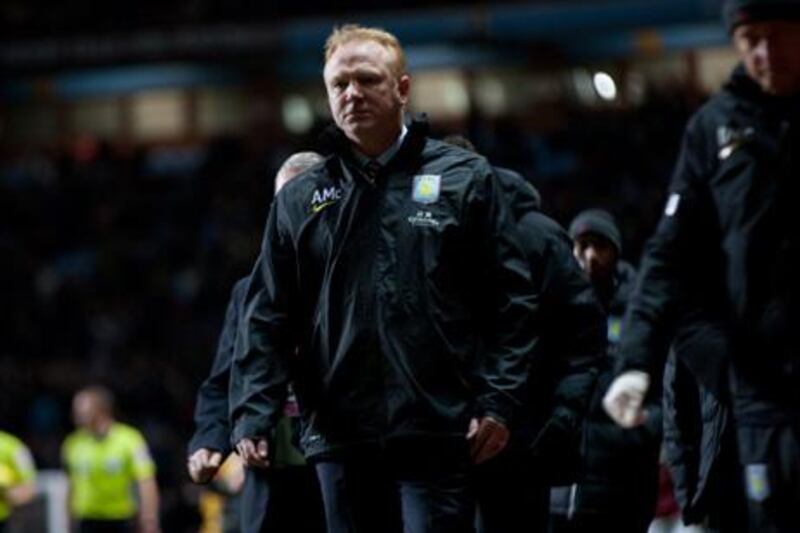The second-half performance was better, the manager said. The fans did not agree.
Having booed their team off at the interval, they did so again after the final whistle.
It was not the fact they lost to Manchester United; having won one of their last 32 league games against Sir Alex Ferguson's side, they are all too accustomed to that. It was the way they did not even attempt to beat them.
Alex McLeish and Aston Villa was always an uneasy alliance. For the Scot, it now seems distinctly uncomfortable.
McLeish had the initial impediment of being a defector from across town, the first Birmingham City manager to trade St Andrew's for Villa Park. It meant he was not afforded a rapturous reception at first. But his past matters most because of his policies.
At the moment, McLeish is trying to purvey Birmingham's brand of football at Aston Villa. It is an approach that ignores the history and expectations of the region's traditional power.
The working men's club could get by on a diet of simple fare, but the aristocrats preferred a feast of flowing football.
At Villa, like West Ham United, Tottenham Hotspur and Newcastle United, results are only part of the consideration. Style matters. Excitement is expected. An understanding of the club's traditions is essential.
But tactically, McLeish is a manager of limited ambition. It is harsh to suggest that he actually tries to draw games 0-0, but that is the impression sometimes given.
A fear of losing can outweigh the will to win. Such safety-first instincts can have a cost: Birmingham only lost 15 league games last season but were still relegated. Victories were too infrequent, draws all too regular.
On Saturday, the isolated striker Darren Bent was seemingly tasked with winning flick-ons for himself, an impossible job.
In one respect, Villa's impotence was epitomised when Emile Heskey's shot went out for a throw (some would simplify that and say it summed up Heskey). But at least it was a shot; there were precious few others.
They have not scored for a month since Bent's winner against Norwich City and among their attacking players, only the rejuvenated Gabriel Agbonlahor appears to be benefiting from McLeish's appointment.
In contrast, defenders such as Richard Dunne, James Collins and Stephen Warnock all appreciate the Scot; as his time at Birmingham shows, he is a connoisseur of clean sheets.
But a manager who favours graft over craft is selecting sides that lack invention.
The nadir was at Tottenham when, in a dire display, the midfield was made up of a full-back, two holding players and an industrious, but non-scoring, striker (Heskey again).
In part, it can be attributed to lesser resources as Villa adapt to their own era of austerity. But only in part; while Stewart Downing and Ashley Young left, the creative contingent have been marginalised or unimpressive.
Charles N'Zogbia, the biggest summer signing, has been underwhelming and was omitted against United after failing to report for a treatment session; off-field problems mean Barry Bannan, who has shown glimpses of his ability, has only had a bit-part role; Marc Albrighton, an enterprising arrival on the scene last season, has been limited to one start; and Stephen Ireland has barely featured more. Collectively, it suggests imaginative players are not trusted.
Nor, at a club with an admirable youth system, has there been much scope for emerging talents.
McLeish's preference is for the tried and trusted but caution has not given him a platform for progress. It could have done: Villa's early-season fixtures represented a soft landing.
December, including Liverpool, Arsenal and Chelsea as well as United, is a truer trial. While Villa are in the top half of the table now, the likelihood is that they will not remain there.
With rumblings of discontent in the stands, McLeish will require a rethink to retain his position in the long term.
As Steve Bruce discovered at Sunderland, once the fans are implacably opposed to a manager, there is no way back. Hard-earned stalemates will not suffice, nor will defeats where, if the scoreline is respectable, there is an unwillingness to commit players forward to fashion a chance.
As one supporter's blog was simply entitled: "You don't play that kind of football at a club like Aston Villa."
----------------------------------------
Sometimes players' reputations are enhanced by their absence. The importance of Jonas Gutierrez to Newcastle was apparent with his performances this season but was underlined by his suspension on Saturday.
Lacking the cover perhaps the hardest-working winger in the division provides, the previously impressive left-back Ryan Taylor was left exposed against Chelsea's Daniel Sturridge.
The right-sided forward had eight shots during the game, eventually scoring the second goal in his side's 3-0 win.
-------------------------------------------------------------------------
It was to prove a doubly damaging day for Newcastle. Steven Taylor, the centre-back who was so defiant at Old Trafford seven days earlier, is likely to miss the rest of the season with an Achilles injury.
It means, for the first time this season, there will be a change in Alan Pardew's back four and, with his natural deputy Mike Williamson also out, could illustrate the thinness of their squad.
And that, in turn, shows how well they have done.






